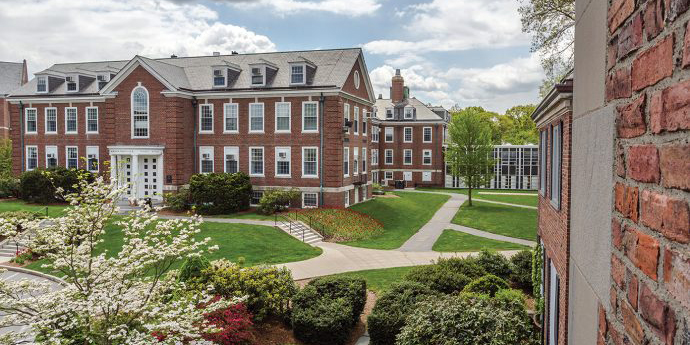The March issue of Boston College Law Review is now available. The issue features three articles by outside authors as well as three student notes. Summaries of the seven pieces can be found below. The full texts are also available on the BCLR website.
Property's Edges by Professors David Dana and Nadav Shoked
In their Article, Professors David Dana and Nadav Shoked explain that the law conceives the edges of any private property as a space where private and public interests inevitably interact and where both must somehow be accommodated. But, because this doctrinal and normative reality has heretofore gone largely unacknowledged, lawmakers are prone to ignore it, particularly when new technologies or geophysical phenomena introduce new activities into the edges of a property or when advances in science improve society’s grasp of the effects of existing activities there. Moving past the unitary vision of property, and drawing instead on its novel theoretical analysis, their Article suggests specific edges solutions to such problems. The Article’s introduction of a new framework for understanding property law protections—the property edges theory—thus not only contributes to existing scholarly discourse, but also aids in tackling daunting real-world property law puzzles.
Evaluating the Legality of Age-Based Criteria in Health Care: From Nondiscrimination and Discretion to Distributive Justice by Professor Govind Persad
In his Article, Professor Persad examines the legality and normative desirability of age-based criteria in health care. Professor Persad defends a distributive justice approach to argue what should be considered the proper criteria for determining how health care is provided to older people. Finally, Professor Persad proposes a detailed normative framework for the use of age-based criteria in health care, the lifetime justice approach, that considers the future life patients can gain from treatment and the past years of life they already have experienced.
The New State Zoning: Land Use Preemption Amid a Housing Crisis by Professor John Infranca
In his Article, Professor John Infranca explores the exclusionary effects of local land use regulations and zoning that have led to the housing crisis in the United States. He argues that bold new reforms of state intervention are necessary to create new affordable housing opportunities. Such interventions should expressly preempt certain narrow elements of local law, add additional planning requirements, procedural steps, or allow for potential appeals. Professor Infranca further argues that these interventions can, and should, provide clear mechanisms for addressing significant countervailing local interests.
The U.S. Military’s Environmental Protection Efforts: Unexpected Eco-Friendly Solutions to Land Management Problems by Curtis Cranston
In his Note, Curtis Cranston argues that, despite current political gridlock over federal environmental policy and the seeming incompatibility between the military and the environment, the U.S. Department of Defense (DoD) has recently demonstrated unexpected leadership in environmental protection efforts. Curtis identifies that the DoD has a significant interest in ensuring military readiness by reducing potential impediments to normal military operations on DoD lands. Often cumulatively referred to as “encroachment,” these outside pressures include land-use restrictions from federal environmental laws as well as more direct interference from nearby civilian populations, such as noise complaints and light pollution. By pursuing initiatives that reduce encroachment on military bases, the DoD has developed several adaptive solutions to its land management challenges—to wit: compatible-use buffering programs that create space between military lands and nearby civilian populations, cooperative partnerships with interested stakeholders outside military bases, and various Service-specific conservation policies. Curtis contends that these DoD efforts produce the “win-win” outcome of responsibly managing natural resources on and surrounding military lands while simultaneously improving national security and military readiness. Curtis argues that Congress and the public should therefore encourage the military’s successful land management efforts by substantially increasing the employment of land buffering programs and collaborative partnerships near military bases before it becomes too late, and that other government agencies with land management responsibilities should follow the DoD’s environmental leadership.
How Was That Reasonable? The Misguided Development of Qualified Immunity and Excessive Force by Law Enforcement Officers by Marcus Nemeth
In his Note, Marcus Nemeth argues that the United States Supreme Court has rendered victims of excessive police force helpless and weaponized an irrational fear of black men into an excuse for murder. Congress passed legislation in 1871 aimed at protecting citizens from police violence, especially black citizens who faced repeated and continuous injustices by the very police officers charged with protecting them. That legislation was short lived however, largely due to the Court created doctrine of qualified immunity. Nemeth explores the case law and policy that created the doctrine of qualified immunity and argues it has been problematically overextended, allowing police officers to kill with impunity.
Pay Up or Else: Immigration Bond and How a Small Procedural Change Could Liberate Immigrant Detainees by Jeremy Pepper
In his Note, Jeremy Pepper explores the procedures governing immigration bond. On any given day, thousands of immigrants are detained while they await their day in court. Many immigrants who are granted bond remain detained due to their inability to pay. This is partially because immigration judges are not required to consider an immigrant’s financial situation when setting bond. A recent decision from the Ninth Circuit requires immigration judges to consider an immigrant’s financial situation when setting bond. This decision has both policy and legal merit and could result in the liberation of thousands of immigrants.



